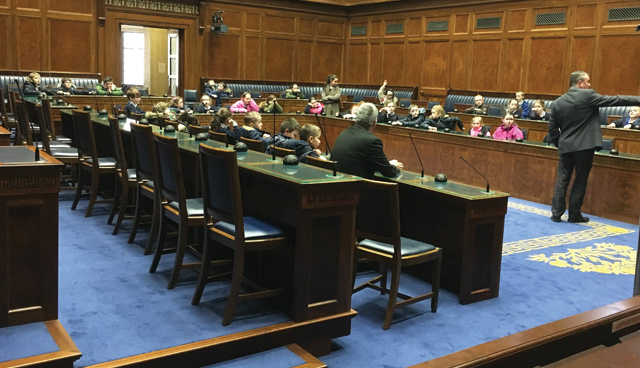Johnson’s Brexit deal and Stormont’s consent

With Boris Johnson having secured a majority that will enable him to push through his Brexit deal, agendaNi examines his last proposal submitted to the EU, specifically the proposed consent mechanism for Northern Ireland contained within.
The DUP’s main argument in Brexit negotiations has always been that there should not be economic or constitutional divergence between Great Britain and Northern Ireland once a deal for the UK’s withdrawal from the EU has been finalised. To this end, they have constantly argued for the inclusion of a consent mechanism within any final Brexit deal that would allow the Stormont Assembly to vote on the special arrangements for Northern Ireland and essentially amount to a veto for either community in the days after the transition period.
The consent mechanism being argued for would require a functioning Assembly at Stormont, which would get a vote four years after the end of the transitionary period in 2024. The DUP had hoped to secure an upfront vote in Stormont, but this now appears unlikely due to both Stormont’s inactivity and the fact that the Conservative Party are no longer reliant on the DUP to force through their Brexit deal.
It is thought that a straightforward numerical majority achieved in a, for now, hypothetical Stormont vote would mean that the special arrangements would be kept in place for four years, at which point another vote would be taken. Cross-community consent, an unlikely occurrence given the diametrically opposed Brexit viewpoints between the DUP and Sinn Féin, would secure the arrangements in place for a further eight years.
When Stormont was functioning, the method by which consent mechanisms operated was that contentious measures required a majority of both unionists and nationalists in order to pass, signalling cross-community support for whatever that measure may be. In effect, this operated as a quasi-veto, whereby the main parties of either community could block the passage of legislation if they claimed it did not have support within their community, as was seen with the DUP’s consistent blocking of same-sex marriage legislation despite its passage through the Stormont voting process.
The deal that Johnson submitted to the EU in October, before December’s General Election delivered him a large majority, proposed that Northern Ireland would remain aligned with EU rules on agriculture and industrial goods after the transitionary period comes to an end, but would also leave the customs union with the rest of the UK and remain fully within the UK Customs Territory. While this contains the constitutional alignment the DUP so desire, it specifically flies in the face of their wish for economic alignment.
Section three of Johnson’s Explanatory Note: UK Proposals for an Amended Protocol on Ireland/Northern Ireland is dedicated to consent. It reads, in full: “The zone of regulatory compliance will mean that Northern Ireland will be, in significant sectors of its economy, governed by laws in which it has no say. That is clearly a significant democratic problem. For this to be a sustainable situation, these arrangements must have the endorsement of those affected by them, and there must be an ability to exit them. That means that the Northern Ireland institutions – the Assembly and the Executive – must be able to give their consent on an ongoing basis to this zone (and to the Single Electricity Market, which raises similar issues).
“Our proposal is that, before the end of the transition period, and every four years afterwards, the UK will provide an opportunity for democratic consent to these arrangements in the Northern Ireland Assembly and Executive, within the framework set by the Belfast (Good Friday) Agreement. If consent is withheld, the arrangements will not enter into force or will lapse (as the case may be) after one year, and arrangements will default to existing rules.”
While the explanatory note contained the provision that a vote would take place before the end of the transitionary period, Secretary of State for Northern Ireland Julian Smith MP almost immediately distanced himself from the possibility and it does seem more likely that if a vote does take place, it will be the mooted vote four years after the end of the transition.
The note’s contention that the British Government will provide an “opportunity” for the Assembly to consent to the special arrangements “within the framework of the Belfast (Good Friday) Agreement” is what makes the note especially interesting. Typically, when talking about matters of consent within the devolved governments of Scotland, Northern Ireland and Wales, we are talking about the Sewel Convention, which “applies when the UK Parliament wants to legislate on a matter within the devolved competence of the Scottish Parliament, National Assembly for Wales or Northern Ireland Assembly”. Under the Sewel Convention, the UK Parliament will “not normally” do this “without the relevant devolved institution having passed a legislative consent motion”.
However, the note containing the phrase “if consent is withheld” suggests the possibility of a Legislative Consent Motion being used. A Consent Motion is typically used if the UK Government proposes legislation that falls under areas typically covered under the remit of the Assembly, with the Assembly asked to provide consent when the proposed legislation is in its final stages. 79 Legislative Consent Motions have been put to the Stormont Assembly in its history, with only one being rejected: the 2015 Enterprise Bill.
For the Legislative Consent Motion process to proceed, the relative departmental Executive Minister must submit a proposal to the Executive. This proposal is sent to the Office of the First and deputy First Minister and must receive the office’s approval before being brought to the Assembly.
While the word “veto” often brings to mind the Petition of Concern, the much-maligned mechanism by which the DUP and Sinn Féin have led the charge to block legislation, it must be remembered that vetoes can also happen at the Executive level, which also requires cross-community voting. Cross-community voting is defined as a majority of the members voting, a majority of the designated nationalists voting and a majority of the designated unionists voting, or the support of 60 per cent of the members voting, 40 per cent of the designated nationalists voting and 40 per cent of the designated unionists.
Typically, when the idea of a DUP or unionist veto in the context of Brexit is being discussed, it is through the Executive voting function, rather than the Petition of Concern that any possible veto would be expected to occur. However, with Boris Johnson now commanding a majority that no longer requires him to make any caveats to the DUP, it remains to be seen whether or not his final Brexit deal will include the consent mechanisms he had previously included in order to satiate unionism’s largest party.






